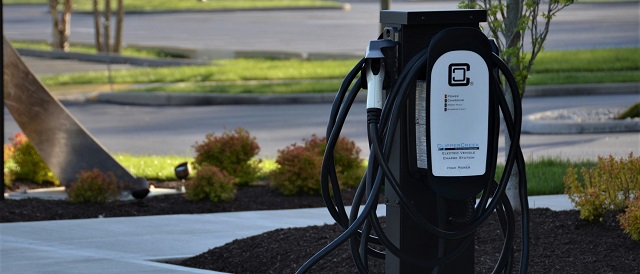Energy
Canada wallows on LNG sidelines, paralyzed by Ottawa’s onerous regulatory system
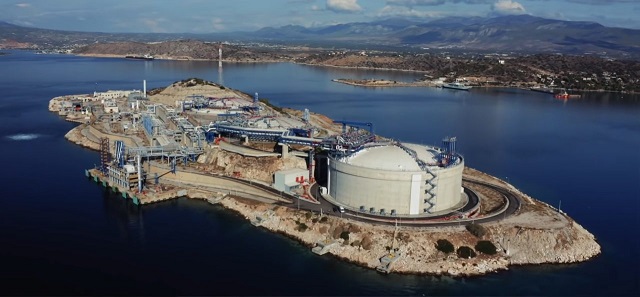
From the Frontier Centre for Public Policy
By Lee Harding
Mitsotakis said Greece has built a major facility outside the city of Alexandroupolis to process incoming LNG tankers. He said Greece will pump LNG to the rest of Europe and needs more at home as the country abandons coal.
When it comes to fossil fuels, the world wants what Canada’s got. The problem is, Prime Minister Justin Trudeau doesn’t care.
Fresh proof came with the recent visit of Kyriakos Mitsotakis, the first Greek leader to come to Canada in more than 40 years.
According to the office of the Prime Minister Trudeau, Mitsotakis was simply here to march in Montreal’s Greek Independence Day Parade, discuss “shared interests” and cut the ribbon as Greece purchased Canadian-made firefighting planes.
But, during an interview with CTV, Mitsotakis said his country would “of course” like to start importing Canadian liquified natural gas (LNG).
“We are a big entry point for LNG, not just for the Greek market, but also for the Balkans, for Eastern Europe. Theoretically, we could even supply Ukraine,” said Mitsotakis.
“In principle, yes, we are very interested in obtaining LNG at competitive prices.”
Mitsotakis said Greece has built a major facility outside the city of Alexandroupolis to process incoming LNG tankers. He said Greece will pump LNG to the rest of Europe and needs more at home as the country abandons coal.
Much of Europe’s energy has traditionally come from Russia or Middle Eastern autocracies. More than a decade ago, author Ezra Levant made the case for Canada’s “Ethical Oil” as a better alternative. Canada’s status as a democratic state that respects human rights and extracts oil with a minimal environmental footprint is as good as it gets. Mitsotakis, a Harvard-educated investment banker, understands that quite readily today.
“Canada is a country (for) which we share so many values,” said Mitsotakis. “I think we see eye-to-eye on many of the challenges that we face.”
Still, there was no mention of energy exports in Trudeau’s public comments regarding Mitsotakis, nor in official government communications about the visit.
Mitsotakis can take little consolation that his treatment is not unusual, as true as that may be. In the past 18 months, both the Japanese prime minister and the German chancellor returned home without official assurances that Ottawa was eager to offer bulk quantities of Canadian LNG.
Japanese Prime Minister Fumio Kishida came to Canada in January, 2023 making no secret of his “high expectations” to reach an LNG export agreement with Canada.
In August 2022, German Chancellor Olaf Scholz came to Canada hoping to reach an LNG deal. “Canada is our partner of choice,” Scholz said at the time.
Somehow, Trudeau said at a press conference with the German leader that there was no “business case” for LNG exports to Europe. Instead, he took the chancellor to an empty field in Newfoundland that was the chosen site for a future Canadian facility to export carbon-neutral hydrogen.
That will help Germany a little, but not nearly enough. The country turned to Qatar and signed a 15-year LNG export deal.
Canada is currently the world’s fifth largest producer of natural gas. But, as is the case with oil, facilities to sell it overseas are very limited. Canada has no LNG export facilities currently operating. Any LNG exports to Europe would have to go through a US export terminal.
Kitimat, BC will open a major export facility in early 2025, but plans to build an LNG pipeline to ports on the East Coast have fallen apart due to high costs.
On Monday, Alberta Energy Minister Brian Jean said “onerous” regulatory procedures were more to blame.
“With massive natural gas reserves, Canada can no longer wait on the LNG sidelines, burdened by an onerous regulatory system. Our allies and trading partners need us. We must have more LNG export facilities approved and built,” Jean said in a statement.
Jean is right. Canada has scuttled one opportunity after another during the Trudeau era, first by smothering pipeline development in onerous regulations. The Northern Gateway pipeline was the only one the nation banned, citing environmental concerns off the coast of northern B.C., despite the fact that 50 tankers passed the same waters every day with exports from Alaska.
Other proposals, such as the Energy East pipeline, were held up in red tape until its proponents decided the project wasn’t worth it. A 30,000-page application went for not, as did the hope that refineries in the Maritimes could refine Canadian products instead of those from the Middle East.
The trans mountain pipeline was also bound up until the government bought it, after which its progress still went painfully slowly. Years late and six times over-budget at a cost of $34 billion, the “long delayed” pipeline is finally ready for crude deliveries.
Bill C-69, dubbed by former Alberta Premier Jason Kenney as the “No More Pipelines Act”, was declared unconstitutional by the Supreme Court of Canada last fall. The development is welcome but cannot restore lost time.
Canada remains poorly positioned to capitalize on another historic opportunity–the European thirst for oil as it tries to distance itself from Russia. Unfortunately, this problem seems more convenient to Ottawa than not. The Canadian government seems more interested in having zero carbon emissions even if that means zero economy. Too bad that makes zero sense.
Lee Harding is a Research Fellow at the Frontier Centre for Public Policy
Energy
Pope Francis calls for ‘global financial charter’ at Vatican climate change conference
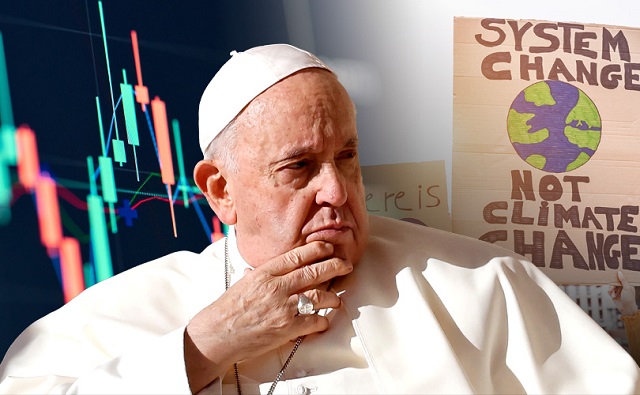
From LifeSiteNews
By Michael Haynes, Snr. Vatican Correspondent
Pope Francis called for a ‘new global financial charter’ by 2025 which would be centered on climate change and ‘ecological debt’ in a keynote address at the Vatican-organized ‘Climate Crisis to Climate Resilience’ conference.
Addressing a Vatican-hosted climate change conference, Pope Francis called for a “new global financial charter” by 2025 which would be centered on climate change and “ecological debt.”
“There is a need to develop a new financial architecture capable of responding to the demands of the Global South and of the island states that have been seriously affected by climate catastrophes,” said Pope Francis on Thursday, May 16.
The Pontiff’s words came towards the end of his keynote address at the conference “Climate Crisis to Climate Resilience,” organized jointly by the Vatican’s Pontifical Academy of Sciences and Pontifical Academy of Social Sciences.
JUST IN: #PopeFrancis urges @CasinaPioIV climate change conf to work for “global de-carbonization” adding: “The data emerging from this summit reveal that the specter of climate change looms over every aspect of existence, threatening water, air, food and energy systems.”… pic.twitter.com/t7cV4ne0s4
— Michael Haynes 🇻🇦 (@MLJHaynes) May 16, 2024
Outlining a three-fold action plan to respond to the “planetary crisis,” Francis told the participants that any such action must be centered around financial action.
“The restructuring and reduction of debt, together with the development of a new global financial charter by 2025, acknowledging a sort of ecological debt – we must work on this term: ecological debt – can be of great assistance in mitigating climate changes,” he said, appearing to allude to an already existing, but as yet unpublished, charter.
The Pope’s three-fold plan also highlighted his call for “policy changes” based on climate adherence and the reduction of warming, fossil fuel reliance, and carbon dioxide:
First, a universal approach and swift and decisive action is needed, capable of producing policy changes and decisions. Second, we need to reverse the curve of warming, seeking to halve the rate of warming in the short space of a quarter of a century. At the same time, we need to aim for global de-carbonization, eliminating the dependence on fossil fuels.
Third, large quantities of carbon dioxide must be removed from the atmosphere through environmental management spanning several generations.
Francis’ call for finance-related policies to implement climate change goals will have been met especially warmly by certain attendees of the Vatican’s conference. Among the numerous participants and speakers at the three-day event were ardent pro-climate change advocates California Gov. Gavin Newsom, London’s Mayor Sadiq Khan, New York Gov. Kathy Hochul, Massachusetts’s lesbian Gov. Maura Healey, along with academics and politicians from South America, Africa, Italy, and Taiwan.
Newsom and Khan – both of whom have implemented sweeping and highly controversial measures in the name of climate change – spoke respectively on “The Gold Standard – Climate Leadership in the Golden State” and “Governance in the Age of Climate Change.” Khan also wrote in the U.K.’s The Tablet that he joins his voice to that of Francis “to support climate resilience efforts and advocate for climate justice.”
Green finance for the future
While no further details were given about the charter Pope Francis referred to, in recent years increased attention has been paid to coordinating climate policies with finance, performing “debt for nature swaps” in line with the World Economic Forum’s policies, and addressing “ecological debt” itself, which is a term itself employed regularly by Francis.
Last October 4, Francis published a second part to his 2015 environmental encyclical letter Laudato Si’ in the form of the Apostolic Exhortation Laudate Deum, in which he issued stark calls for “obligatory” measures across the globe to address the issue of “climate change.”
READ: Pope Francis calls for obligatory global ‘climate change’ policies in new document ‘Laudate Deum’
“It is no longer possible to doubt the human – ‘anthropic’ – origin of climate change,” wrote the Pontiff, before later calling for mandatory alignment with “green” policies:
If there is sincere interest in making COP28 a historic event that honors and ennobles us as human beings, then one can only hope for binding forms of energy transition that meet three conditions: that they be efficient, obligatory and readily monitored.
Francis’ oft-repeated lines on the subject have repeatedly born similarities to the sentiments expressed by key globalist and founder of the World Economic Forum (WEF) Klaus Schwab, whose proposed anti-Catholic “Great Reset” is underpinned by a focus on a “green” financial agenda, as he mentions the “withdrawal of fossil-fuel subsidies” and a new financial system based on “investments” which advance “equality and sustainability” and the building of a “‘green’ urban infrastructure.”
Indeed, the world of finance is one of the sectors that is most devoted to implementing “climate change” policies, such as those outlined by the Paris Agreement – the pro-abortion climate agreement to which the Vatican joined in 2022.
A lesser-known third aim of the Paris Agreement pertains directly to the financial element of the document, ensuring that the future of global finance is directly connected to the various climate change efforts laid out in the Paris Agreement. It reads:
Making finance flows consistent with a pathway towards low greenhouse gas emissions and climate-resilient development.
This aim provides the basis for international governments to link provision of finance to the implementation of the “green” agenda of the Paris Agreement. The almost unknown Network of Central Banks and Supervisors for Greening the Financial System (NGFS) was born at the Paris “One Planet Summit” in December 2017, with the purpose of transforming the global economy in alignment with “green” climate change policies.
READ: Secretive international banking group may enforce Great Reset ‘green’ agenda on world
Already, it numbers 138 members, with an additional 21 observer organizations, including national and international banks such as the “Bank of Canada; Bank of England; Banque de France; Dubai Financial Services Authority; European Central Bank; Japan FSA; People’s Bank of China; Swiss National Bank; U.S. Federal Reserve.”
Such policies are regularly at the forefront of international finance meetings as well. One such example was last year, when French President Emmanuel Macron called for a “public finance shock” based around climate issues and global finance. His address was given to international leaders at the 2023 Summit for a New Global Financial Pact, held in Paris.
Canadian Energy Centre
Trans Mountain completion shows victory of good faith Indigenous consultation
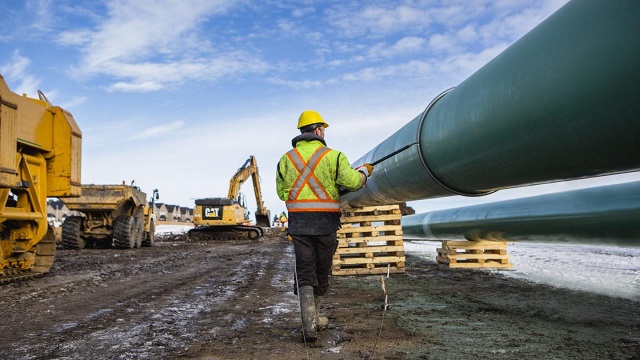
Photo courtesy Trans Mountain Corporation
From the Canadian Energy Centre
‘Now that the Trans Mountain expansion is finally completed, it will provide trans-generational benefits to First Nations involved’
While many are celebrating the completion of the Trans Mountain pipeline expansion project for its benefit of delivering better prices for Canadian energy to international markets, it’s important to reflect on how the project demonstrates successful economic reconciliation with Indigenous communities.
It’s easy to forget how we got here.
The history of Trans Mountain has been fraught with obstacles and delays that could have killed the project, but it survived. This stands in contrast to other pipelines such as Energy East and Keystone XL.
Starting in 2012, proponent Kinder Morgan Canada engaged in consultation with multiple parties – including many First Nation and Métis communities – on potential project impacts.
According to Trans Mountain, there have been 73,000 points of contact with Indigenous communities throughout Alberta and British Columbia as the expansion was developed and constructed. The new federal government owners of the pipeline committed to ongoing consultation during early construction and operations phase.
Beyond formal Indigenous engagement, the project proponent conducted numerous environmental and engineering field studies. These included studies drawing on deep Indigenous input, such as traditional ecological knowledge studies, traditional land use studies, and traditional marine land use studies.
At each stage of consultation, the proponent had to take into consideration this input, and if necessary – which occurred regularly – adjust the pipeline route or change an approach.
With such a large undertaking, Kinder Morgan and later Trans Mountain Corporation as a government entity had to maintain relationships with many Indigenous parties and make sure they got it right.
 Trans Mountain participates in a cultural ceremony with the Shxw’ōwhámél First Nation near Hope, B.C. Photograph courtesy Trans Mountain
Trans Mountain participates in a cultural ceremony with the Shxw’ōwhámél First Nation near Hope, B.C. Photograph courtesy Trans Mountain
It was the opposite of the superficial “checklist” form of consultation that companies had long been criticized for.
While most of the First Nation and Métis communities engaged in good faith with Kinder Morgan, and later the federal government, and wanted to maximize environmental protections and ensure they got the best deal for their communities, environmentalist opponents wanted to kill the project outright from the start.
After the government took over the incomplete expansion in 2018, green activists were transparent about using cost overruns as a tactic to scuttle and defeat the project. They tried to make Trans Mountain ground zero for their anti-energy divestment crusade, targeting investors.
It is an amazing testament to importance of Trans Mountain that it survived this bad faith onslaught.
In true eco-colonialist fashion, the non-Indigenous activist community did not care that the consultation process for Trans Mountain project was achieving economic reconciliation in front of their eyes. They were “fair weather friends” who supported Indigenous communities only when they opposed energy projects.
They missed the broad support for the Trans Mountain expansion. As of March 2023, the project had signed agreements with 81 Indigenous communities along the proposed route worth $657 million, and the project has created over $4.8 billion in contracts with Indigenous businesses.
Most importantly, Trans Mountain saw the maturing of Indigenous capital as Indigenous coalitions came together to seek equity stakes in the pipeline. Project Reconciliation, the Alberta-based Iron Coalition and B.C.’s Western Indigenous Pipeline Group all presented detailed proposals to assume ownership.
Although these equity proposals have not yet resulted in a sale agreement, they involved taking that important first step. Trans Mountain showed what was possible for Indigenous ownership, and now with more growth and perhaps legislative help from provincial and federal governments, an Indigenous consortium will be eventually successful when the government looks to sell the project.
If an Indigenous partner ultimately acquires an equity stake in Trans Mountain, observers close to the negotiations are convinced it will be a sizeable stake, well beyond 10 per cent. It will be a transformative venture for many First Nations involved.
Now that the Trans Mountain expansion is finally completed, it will provide trans-generational benefits to First Nations involved, including lasting work for Indigenous companies. It will also demonstrate the victory of good faith Indigenous consultation over bad faith opposition.
-

 COVID-192 days ago
COVID-192 days agoJapan’s most senior cancer doctor: COVID shots are ‘essentially murder’
-

 Alberta2 days ago
Alberta2 days agoProvince announces next step to revamped health care system
-

 Automotive1 day ago
Automotive1 day agoGovernments in Canada accelerate EV ‘investments’ as automakers reverse course
-

 COVID-192 days ago
COVID-192 days agoTrudeau government only sought legal advice after Emergencies Act was invoked, records indicate
-
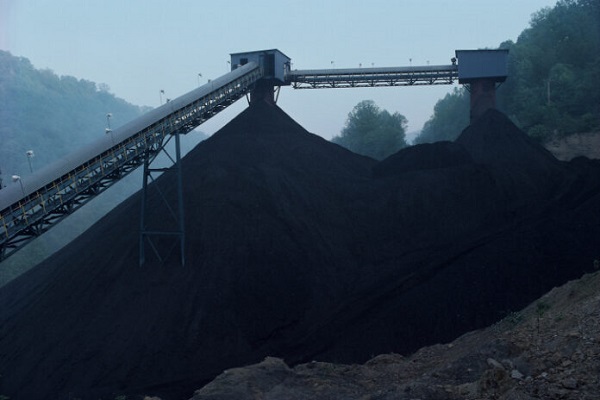
 Economy1 day ago
Economy1 day agoBiden signs suicidal ‘No Coal’ pact, while rest of world builds 1,000 new plants
-

 Automotive1 day ago
Automotive1 day agoRed States Sue California and the Biden Administration to Halt Electric Truck Mandates
-

 Alberta1 day ago
Alberta1 day agoPharmacist-led clinics improve access to health care: Lessons from Alberta
-
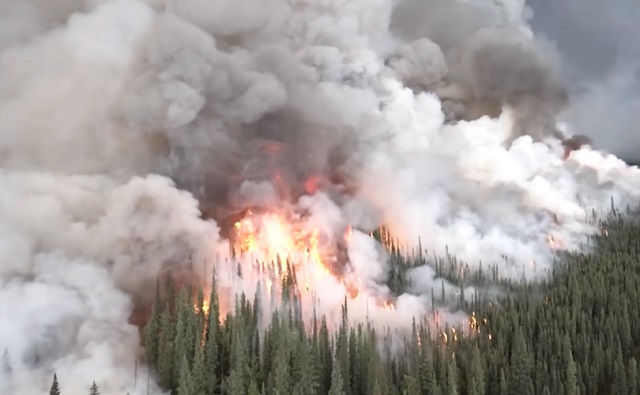
 National1 day ago
National1 day agoTrudeau again blames ‘climate change’ for mostly man-made wildfires




